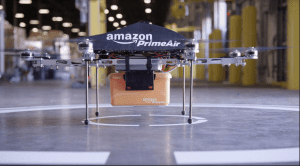 Earlier this year, my colleague Ralph Rio wrote an insightful and very popular article about Amazon’s interest in drones for home delivery. Amazon is continuing to push forward with their drone research and testing. One major obstacle, however, is rules that are in place by the Federal Aviation Authority (FAA). In a letter to the FAA, Amazon has warned that if the FAA does not relax its attitude towards drone regulations, the company will be forced to move all of its drone testing overseas. This is not too surprising, as Amazon is already testing drones in the UK. Additionally, sources have said in the past that India will be the launchpad for Amazon’s drone delivery service. But Amazon certainly sees potential in the US market, despite FAA regulation that make commercial use of drones illegal. In fact, the FAA struck down beer delivery drones to ice fishermen earlier this year.
Earlier this year, my colleague Ralph Rio wrote an insightful and very popular article about Amazon’s interest in drones for home delivery. Amazon is continuing to push forward with their drone research and testing. One major obstacle, however, is rules that are in place by the Federal Aviation Authority (FAA). In a letter to the FAA, Amazon has warned that if the FAA does not relax its attitude towards drone regulations, the company will be forced to move all of its drone testing overseas. This is not too surprising, as Amazon is already testing drones in the UK. Additionally, sources have said in the past that India will be the launchpad for Amazon’s drone delivery service. But Amazon certainly sees potential in the US market, despite FAA regulation that make commercial use of drones illegal. In fact, the FAA struck down beer delivery drones to ice fishermen earlier this year.
In his letter to the FAA, Amazon’s vice president of global public policy Paul Misener wrote:
“Without the ability to test outdoors in the United States soon, we will have no choice but to divert even more of our [drone] research and development resources abroad. I fear the FAA may be questioning the fundamental benefits of keeping [drone] technology innovation in the United States.”
I asked Ralph Rio for his take on Misener’s letter and whether it could make an impact on the FAA’s current laws. Additionally, with more companies looking to introduce drone deliveries to control the last mile of the customer experience, would there be any changes to planned overhauls that could become more restrictive in 2015 and beyond.
“In my honest opinion, segment the administrative FAA from the elected politicians. The FAA is a bureaucracy. People in a bureaucracy do not want to be blamed for a mistake; they are highly cautious. The FAA is already under high pressure to act, but they haven’t. The additional pressure from Amazon will have little or no effect.
The politicians are highly motivated for votes to get re-elected. If Amazon identifies a specific set of employees who will lose their jobs, this will engage the corresponding congressman and/or senator. To date, the FAA has been the primary participant. If a senator applies pressure, then there could be an effect. Otherwise, no.”
 So it appears that Amazon may need to push more drone research resources overseas, at least for the foreseeable future. Looking at the complete opposite end of the spectrum, Amazon is also experimenting with some low tech initiatives for faster delivery time frames. Currently, the company is looking at the use of bicycles for one hour deliveries in Manhattan. Amazon has run several time trials with bike messengers from various bike courier companies. The winner of the time trials, according to reports, will win the right to run packages for Amazon. The time trials consider both speed and safety – the quickest and most careful will win.
So it appears that Amazon may need to push more drone research resources overseas, at least for the foreseeable future. Looking at the complete opposite end of the spectrum, Amazon is also experimenting with some low tech initiatives for faster delivery time frames. Currently, the company is looking at the use of bicycles for one hour deliveries in Manhattan. Amazon has run several time trials with bike messengers from various bike courier companies. The winner of the time trials, according to reports, will win the right to run packages for Amazon. The time trials consider both speed and safety – the quickest and most careful will win.
With a large New York City home base, this move is a way to bolster local deliveries in one of their prime markets. With crowdsourcing same day delivery options such as Deliv, as well as local retailers increasing their use of same day deliveries, this move could prove to be beneficial to Amazon. The use of bike messengers could be especially convenient during heavy traffic times. The service will clearly be used for delivering small items; using bicycles rather than trucks will allow Amazon to push out more orders and pack their private fleet trucks more efficiently or avoid the use of other carriers. It will be interesting to see how this service translates to other metropolitan areas.

















Leave a Reply